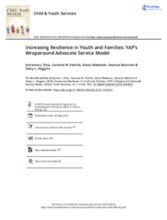Abstract
Youth in marginalized situations worldwide face similar challenges threatening their wellbeing. Strength-based, individually tailored community-based services that wrap around youth and families aid in promoting resilience, that is, the ability to thrive in the face of adversity. For more than 40 years, Youth Advocate Programs, Inc. (YAP) has provided such services to empower youth with complex challenges to live productively within their home environments by utilizing a blended Wraparound Advocate Service Model. In this article, a team of practitioners explores the basis, implementation, research base, and future application of YAP’s dual-prong service model in building resilience.
Youth Advocate Programs, Inc. (YAP) is a U.S.-based nonprofit organization founded in 1975 (Youth Advocate Programs, Inc., 2013–2018a). It provides comprehensive, community-based services as an alternative to institutionalization for youth and young adults with complex needs and challenges. YAP’s service population must navigate family dysfunction and fragmentation, poverty, homelessness, neglect and abuse, community violence, commercial and sexual exploitation, juvenile and criminal justice involvement of youth and/or parents, and mental and behavioral health concerns, including substance use. Youth and families served are usually involved in the child welfare, juvenile justice, behavioral health, developmental disabilities, education, and adult systems; many are crossover youth involved in multiple systems (Youth Advocate Programs, Inc., 2013–2018a). The average age of youth served is 14 (Youth Advocate Programs, Inc., 2018). YAP uses an effective, hybrid approach that melds wraparound and advocate service models. It is this combination and application of both components with fidelity to best practices that distinguishes the YAP Wraparound Advocate Model.

